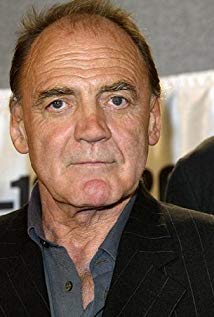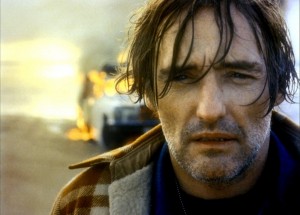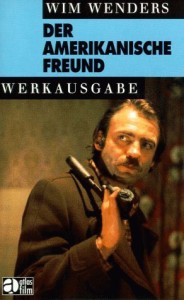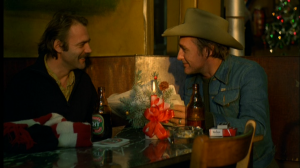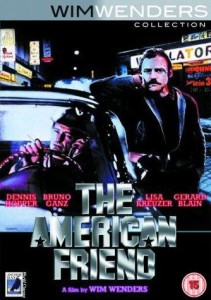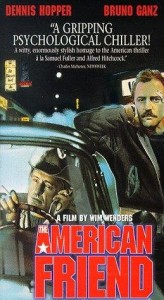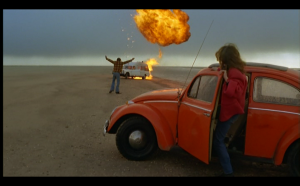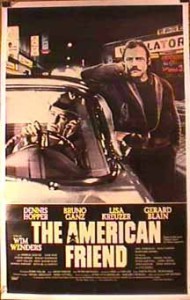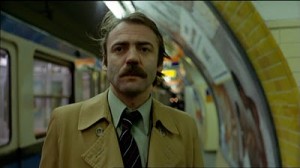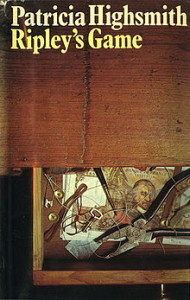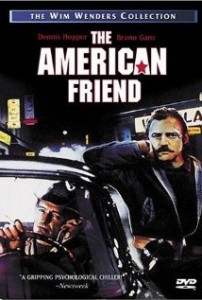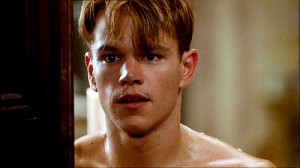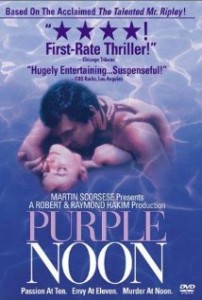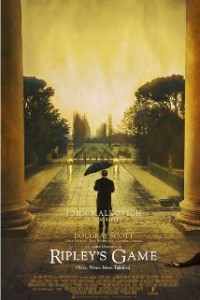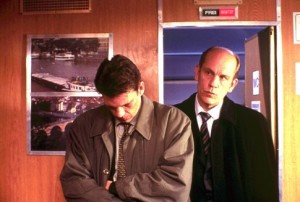The American Friend [Der Amerikanische Freund] **** (1977, Dennis Hopper, Bruno Ganz, Lisa Kreuzer, Gérard Blain) – Classic Movie Review 132
Patricia Highsmith’s brilliant, nail-biting 1974 bestselling thriller novel Ripley’s Game becomes Wim Wenders’s impressively slick and dark-toned 1977 film The American Friend [Der Amerikanische Freund]. Dennis Hopper stars as the talented Mr Tom Ripley.
‘There’s no such thing as a perfect murder. That’s just a parlour game, trying to dream one up. Of course you could say there are a lot of unsolved murders. That’s different.’
Patricia Highsmith’s brilliant, nail-biting 1974 bestselling thriller novel Ripley’s Game (the third book in her Tom Ripley sequence) becomes an impressively slick and dark-toned movie, The American Friend [Der Amerikanische Freund] (1977), under German writer-director Wim Wenders, maker of Wings of Desire and Paris, Texas.
Dennis Hopper stars as the talented Mr Tom Ripley, a refined art forging dealer and serial killer who detests murder. He prefers someone else to do his dirty work, if possible.
He is asked by his lowlife criminal underworld buddy Raoul Minot (Reeves Minot in the book) to help him out with a couple of convenient killings. He feels too fastidious to do it himself and thinks of saying no. And then, just by accident, he finds the right man for the job, or thinks he does.
Bruno Ganz co-stars as a Swiss picture framer living in Hamburg called Jonathan Zimmerman (he is an Englishman called Trevanny living in Fontainebleau in the book), exactly the man with no criminal record Ripley needs, who would perhaps be prepared to commit ‘two simple murders’ for a generous fee.
Plus, Ripley, offended by an offhand remark at an art auction, doesn’t like the man, at first, and wants to ensnare him in his trap for a little sadistic sport. It’s a game. At the start of the story, we watch a psychopathic anti-hero in the ultra-creepy process of the seduction of an ordinary decent man.
Zimmermann is not the criminal type, let alone the killer sort. But, convinced by faked lab reports that he is dying of his rare incurable leukaemia-type blood disease, he steps up to face the moral dilemma Ripley imposes on him and reluctantly involves himself in Ripley’s Game.
In return for a lot of money to leave to his wife and kid for after he is gone, Zimmermann starts the business of committing the murder of two lowlife victims he doesn’t know and Ripley needs out of the way.
Zimmermann agrees to shoot an American gangster in a Paris Métro station. But then Ripley plans to have Zimmermann murder another American gangster. It’s going to be murder on the Hamburg express. This time the gangster will be on a speeding train, and Zimmermann will be using a garrote. It turns out that Zimmermann is going to need a bit of help from Ripley…
Wenders is probably the wrong director for this adaptation, and he does not make the most of all the chances the story offers. He seems to be more interested in making a European art movie rather than a neo-noir thriller. He does not seem really to get Highsmith properly, or wants to change her work so much to make it his own that he is not interested in being faithful to the spirit of the material.
It is good that he concentrates on developing the oddball character studies and the fascinating relationship between the two men. But he is not so good at the nuts and bolts of the apparatus of the thriller and mechanics of its wonderful plot.
Perhaps what is partly wrong is down to the continual daily re-writing and Hopper’s constant improvising of his dialogue, taking things further and further away from Highsmith and more and more into chaos. It is surprising, then, that the finished film is so smooth, polished and unmuddled.
And the movie rivets the attention anyway thanks to the total indestructibility and power of Highsmith’s characters and story. Wenders manages a lot of atmosphere and tension throughout and there are some memorable sequences, especially the multi-murder scene of mayhem on the train, which is also a highlight of Highsmith’s book and the 2002 remake Ripley’s Game. Robby Müller’s moody, noirish colour cinematography is a brilliant adornment to the movie.
Hopper is not ideally cast as Ripley, the amoral murdering ‘friend’ of the title (with ‘friends’ like this who needs enemies?). And Ganz is not really quite right as the bewildered framer, either. But nothing stops their barnstorming performances, quirky, involving and ultimately memorable. Both performances are incredibly intense, Hopper’s outwardly so and Ganz’s inwardly.
Lisa Kreuzer does well in the less rewarding role of Zimmermann’s wife Marianne, and also effective are Nicholas Ray as the artist Derwatt who has faked his own death, Gérard Blain as Ripley’s lowlife buddy Raoul Minot and Samuel Fuller as an American mobster.
Whatever you think about it, it is clearly a must-see for all thriller fans, completing your Ripley collection. And it is fascinating to compare with the utterly different 2003 remake Ripley’s Game or with the film-making styles of Plein Soleil or The Talented Mr Ripley or Ripley (2024), the three versions of the first Ripley book.
The final delicious irony of the German title of Ripley’s Game is that Ripley learns to respect Zimmermann and does actually become his American Friend before the movie is over. But, by then, it’s all too late. There are so many weird and wonderful corners in this story that it repays endless revisits, in either film or book form.
Wenders casts all the gangster roles with film directors, including Gérard Blain, Samuel Fuller, Peter Lilienthal, and Daniel Schmid. Also Nicholas Ray plays the artist, and Jean Eustache a friendly Frenchman.
American pop music is heard or referenced in the film. Ripley quotes the ‘Ballad of Easy Rider’ from Hopper’s film Easy Rider (1969) and Bob Dylan’s ‘One More Cup of Coffee’ and ‘I Pity the Poor Immigrant’. This is not the Ripley of the books, but never mind.
Wenders wanted to film one of Highsmith’s novels, especially The Cry of the Owl or The Tremor of Forgery, but the rights were sold. So he met her and she offered him the then unpublished manuscript of Ripley’s Game (published 1974).
Wenders disliked the title Ripley’s Game, and shot his film under the title Framed. He wanted John Cassavetes as Ripley but he declined, suggesting Hopper instead.
Highsmith disliked Hopper’s Ripley but changed her mind after seeing the film a second time, saying he captured the essence of the character.
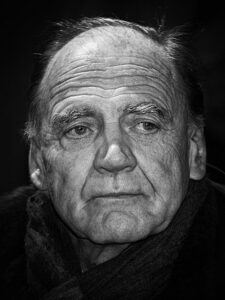
Bruno Ganz (22 March 1941 – 16 February 2019) is a Swiss actor whose career in German stage, TV and film spanned nearly 60 years.
RIP Bruno Ganz, the acclaimed Swiss-born film and theatre actor, best known for playing the angel Damiel in Wenders’s Wings of Desire (1987) and Adolf Hitler in the Oscar-nominated Downfall (2004), who died on 15 February 2019, aged 77. For Downfall, he was voted Actor of the Year by the London Film Critics Circle in 2006.
The cast are Dennis Hopper as Tom Ripley, Bruno Ganz as Jonathan Zimmermann, Lisa Kreuzer as Jonathan’s wife Marianne Zimmermann, Gérard Blain as French gangster Raoul Minot, Nicholas Ray as artist Derwatt. Samuel Fuller as gangster The American, Peter Lilienthal as gangster killed on the train Marcangelo, Daniel Schmid as gangster killed in the subway Igraham, Sandy Whitelaw as Doctor in Paris, Jean Eustache as Friendly Man, Lou Castel as Minot’s henchman Rodolphe, Andreas Dedecke as Jonathan’s son Daniel Zimmermann, David Blue as Allan Winter, Stefan Lennert as Auctioneer, Rudolf Schündler as Marianne’s boss Gantner, Gerty Molzen as Old Lady, a customer, Heinz Joachim Klein as Dr Gabriel, Heinrich Marmann as Man on the Train with a dog, Satya De La Manitou as The American’s henchman Angie, Axel Schiessler as Marcangelo’s bodyguard Lippo, Adolf Hansen as Conductor, and Rosemarie Heinikel as Mona.
http://derekwinnert.com/the-talented-mr-ripley-classic-film-review-41/
http://derekwinnert.com/ripleys-game-classic-film-review-108/
© Derek Winnert Classic Movie Review 132
Check out more film reviews on derekwinnert.com
